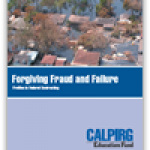
Forgiving Fraud and Failure
For this report, we reviewed hundreds of records and found numerous cases of contractors with questionable records receiving contracts without competition or sufficient time to determine the extent of the problems identified. While the report outlines specific contractor practices, it is as much an indictment of the process as it is about any single company.
Downloads
CALPIRG Education Fund

Executive Summary
Companies with immediate past histories of shoddy work and fraudulent practices are being rewarded with billions of dollars in federal contracts. The data suggest that the process by which the federal government currently spends more than $400 billion per year in taxpayer funds is insufficient to ensure that goods and services purchased are a good value for the American people.
The rapid increase of federally contracted dollars – 86% since 2000 – makes outsourcing the fastest growing component of discretionary spending. The government’s preference for using outside contractors for goods and services makes careful scrutiny of the process and the decisions more important than in the past. At present, loose rules, lack of competition, and limited accountability permit so-called ‘bad actors’ to receive contracts that put taxpayers and our money at risk.
For this report, we reviewed hundreds of records and found numerous cases of contractors with questionable records receiving contracts without competition or sufficient time to determine the extent of the problems identified. While the report outlines specific contractor practices, it is as much an indictment of the process as it is about any single company.
The profiles included in this report illustrate how little consideration is given to past performance. The range of contracts shows the breadth of the problem and a sampling of the companies involved. A few examples include:
Bank of America: The company experienced several instances in a single year (2006) in which unencrypted data files were lost or stolen. In one instance, the bank lost records for 1.2 million federal employees including records of United States Senators. Federal agencies including the IRS continued to award the company contracts for data processing and management services. More than 60% of the 2006 contract dollars were awarded without competition.
Fluor Corporation: Company executives were accused in 2000 of misusing federal contract dollars to buy luxury condos, a fine art collection and a Mercedes-Benz for the company president. The case settled in 2005. Less than a year later, Fluor Corporation’s contracts with the federal government increased by $1 billion; the value of the company’s non-competitively bid contracts rose from 5.7% to 43%. A significant portion of the contracts were for hurricane relief in the Gulf coast.
General Electric: Among other concerns, GE allegedly sold the government faulty helicopter and airplane engine blades in 1999 and 2000. In August 2005, while settlement negotiations in the case were underway, the federal government was also in the process of granting GE the better part of a new $2.4 billion contract to build aircraft engines. The company forced the government to obtain a warrant to retrieve documents for its fraud case. That same year almost half of GE’s federal contract dollars were awarded without competition.
These are just a few of the examples that illustrate how the current system lacks accountability and appears to accept and, by default, reward bad behavior. Changes are necessary to stem the immediate and consistent flow of money to contractors that do not act responsibly with taxpayer funds.
Changes must include:
• an increase in disclosure of contract information. We can greatly increase the level of accountability if the public has access to the actual contracts, track records of companies, compliance records with relevant laws and regulations, and evaluations of the work completed.
• an increase in competition. The percentage of contracts awarded without full and open competition has increased to 40%. We must restore competition to the vast majority of contracts.
• a strengthening of the rules to screen bad actors. The ability to engage in sloppy or fraudulent behavior without consequence all but removes accountability from the process. We need tighter rules that reward responsible contractors and hold others accountable for their actions.
The California Public Interest Research Group Education Fund (CALPIRG) is a result-oriented public interest group that protects consumers, encourages a fair sustainable economy, and fosters responsive democratic governance.
Topics
Find Out More


Safe At Home in 2024?

What the California Consumer Privacy Act means for you
